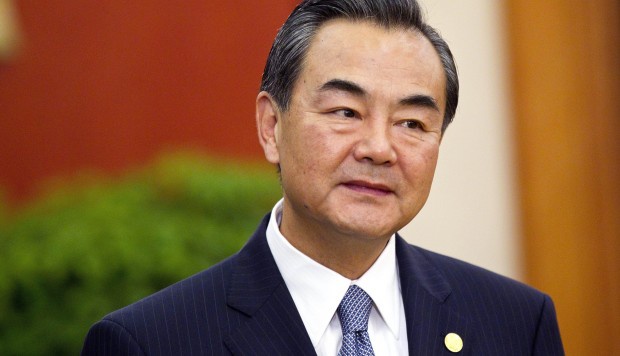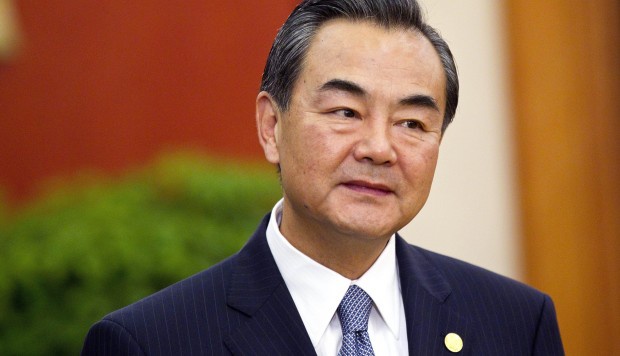By Zhao Cheng from People’s Daily

China has scored a series of trailblazing achievements from its diplomatic work in 2017 under the strong leadership of the Central Committee of the Communist Party of China with Comrade Xi Jinping at its core, Chinese Foreign Minister Wang Yi said in an exclusive interview with People’s Daily in late December.
Wang said that the country is making itself the most positive element in the current international system, and the most active driving force in global governance.
Wang cited Xi in his speeches at the World Economic Forum in Davos and the United Nations Office at Geneva as Chinese President calling on the world to rebalance the process of economic globalization and build a community of shared future for mankind.
During the Belt and Road Forum for International Cooperation hosted by China this May, en-route countries reached consensus to accelerate the construction of the Belt and Road, the foreign minister said, adding that a network has been woven from the Eurasian continent that stretches to other continents and oceans.
China-US ties, based on the principle of mutual respect and mutual benefit, have realized stable development in 2017, he concluded, stressing that three face-to-face meetings, as well as multiple phone calls and correspondence between the two heads of state have given direction to and provided dialogue platforms for bilateral relations in the new era.
China also raised its strategic coordination with Russia towards a higher level, said the minister.
The country, according to Wang, has brought the good-neighborly friendship with surrounding countries to a new high as well. By choosing Vietnam and Laos as the first destinations for overseas visits after the 19th CPC National Congress, Xi has sent a clear message to co-establish a community of shared future with the surrounding countries, he said.
In the past year, China reached a phased consensus with the Republic of Korea on the deployment of the highly controversial Terminal High Altitude Area Defense anti-missile system and China-Japan relations also showed improving momentum, Wang pointed out.
Wang said that bearing the goal of denuclearization of the Korean Peninsula in mind, China in 2017 fulfilled its international obligation by proposing the "suspension for suspension" initiative which aims to restart peace talks and the dual-track approach that seeks the long-term stability of the peninsula.
China through peaceful diplomatic means resolved the standoff in the Dong Lang (Doklam) area caused by the border-crossing Indian troops, Wang stressed, adding that it has not only protected territorial sovereignty but also maintained the correct direction of China-India ties.
Wang stressed that a series of creative visions, new thinking and new strategies put forward by Xi has pointed out a direction for all-round efforts in the country’s pursuit of major country diplomacy with Chinese characteristics.
Thanks to Xi’s conduct of head-of-state diplomacy, China has presented an image as a major country, and its international status and influence also witnessed a historic improvement, Wang said.
Wang said that the country is making itself the most positive element in the current international system, and the most active driving force in global governance.
Wang cited Xi in his speeches at the World Economic Forum in Davos and the United Nations Office at Geneva as Chinese President calling on the world to rebalance the process of economic globalization and build a community of shared future for mankind.
During the Belt and Road Forum for International Cooperation hosted by China this May, en-route countries reached consensus to accelerate the construction of the Belt and Road, the foreign minister said, adding that a network has been woven from the Eurasian continent that stretches to other continents and oceans.
China-US ties, based on the principle of mutual respect and mutual benefit, have realized stable development in 2017, he concluded, stressing that three face-to-face meetings, as well as multiple phone calls and correspondence between the two heads of state have given direction to and provided dialogue platforms for bilateral relations in the new era.
China also raised its strategic coordination with Russia towards a higher level, said the minister.
The country, according to Wang, has brought the good-neighborly friendship with surrounding countries to a new high as well. By choosing Vietnam and Laos as the first destinations for overseas visits after the 19th CPC National Congress, Xi has sent a clear message to co-establish a community of shared future with the surrounding countries, he said.
In the past year, China reached a phased consensus with the Republic of Korea on the deployment of the highly controversial Terminal High Altitude Area Defense anti-missile system and China-Japan relations also showed improving momentum, Wang pointed out.
Wang said that bearing the goal of denuclearization of the Korean Peninsula in mind, China in 2017 fulfilled its international obligation by proposing the "suspension for suspension" initiative which aims to restart peace talks and the dual-track approach that seeks the long-term stability of the peninsula.
China through peaceful diplomatic means resolved the standoff in the Dong Lang (Doklam) area caused by the border-crossing Indian troops, Wang stressed, adding that it has not only protected territorial sovereignty but also maintained the correct direction of China-India ties.
Wang stressed that a series of creative visions, new thinking and new strategies put forward by Xi has pointed out a direction for all-round efforts in the country’s pursuit of major country diplomacy with Chinese characteristics.
Thanks to Xi’s conduct of head-of-state diplomacy, China has presented an image as a major country, and its international status and influence also witnessed a historic improvement, Wang said.
 Menu
Menu
 China makes trailblazing diplomatic achievements in 2017: Foreign Minister
China makes trailblazing diplomatic achievements in 2017: Foreign Minister
















